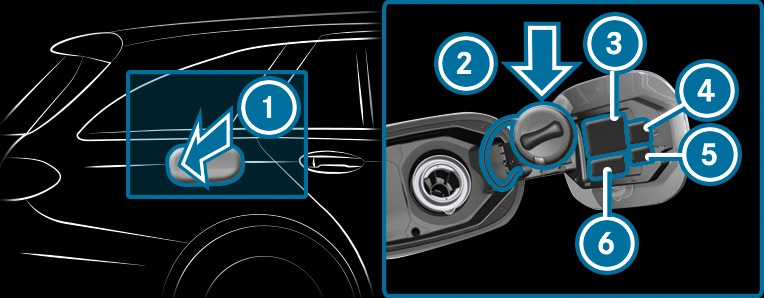Fuels are highly flammable.
Fuels are poisonous and hazardous to your health.
If you or other people come into contact with fuel, observe the following:
Electrostatic charge can create sparks and thereby ignite fuel vapours.
This discharges any electrostatic charge that may have built up.
Otherwise, electrostatic charge could build up again.
Vehicles with a diesel engine:
If you mix diesel fuel with petrol, the flash point of the fuel mixture is lower than that of pure diesel fuel.
While the engine is running, component parts in the exhaust system may overheat without warning.
Fuel that does not conform to the required quality can lead to increased wear as well as damage to the engine and exhaust system.
Vehicles with a petrol engine:
Even small amounts of the wrong fuel could result in damage to the fuel system, the engine and the emission control system.
Fuel of this specification may contain up to 10% ethanol. Your vehicle is suitable for use with E10 fuel.
diesel
regular petrol with an octane number lower than 91 RON
petrol with more than 10% ethanol by volume, e.g. E15, E20, E85, E100
petrol with more than 3% methanol by volume, e.g. M15, M30
petrol with additives containing metal
If you accidentally refuel with the wrong fuel:
Vehicles with a diesel engine:
Even small amounts of the wrong fuel could result in damage to the fuel system, the engine and the emission control system.
In countries without sulphur-free diesel fuel, only refuel with low-sulphur diesel fuel with a sulphur content less than 50 ppm.
petrol
marine diesel
heating oil
pure bio-diesel fuel or vegetable oil
paraffin or kerosene
If you accidentally refuel with the wrong fuel:
Do not switch on the ignition. Otherwise fuel can enter the engine.
Even small amounts of the wrong fuel could result in damage to the fuel system and the engine. The repair costs are high.
Do not switch on the ignition. Otherwise, fuel can enter the fuel system.
Even small amounts of the wrong fuel could result in damage to the fuel system and the engine. The repair costs are high.
The vehicle is unlocked.
Do not get into the vehicle again during the refuelling process. Otherwise, electrostatic charge could build up again.
Observe the notes on operating fluids More.







 .
.  .
. Vehicles with a diesel engine: the filler neck is designed for refuelling at diesel filling pumps.
Vehicles with a diesel engine: when the fuel tank is completely empty, top up with at least 5 litres of diesel.
Vehicles with a diesel engine: use a filler neck with a large diameter for vehicles with a diesel engine when topping up fuel from a fuel can. Otherwise, the filler neck cannot slide into the tank.

